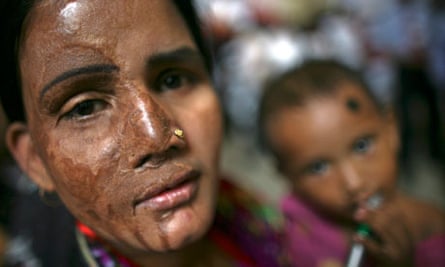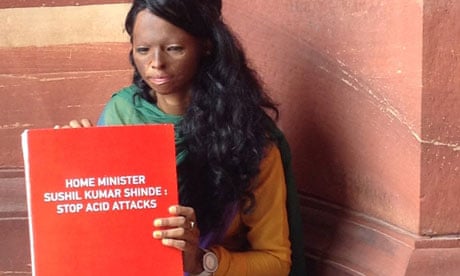After eight years of running between police stations, hospitals and courts, Laxmi, 22, an acid attack victim, can finally relax a little.
On Tuesday, after relentless pressure and criticism from the supreme court, the Indian government published guidelines to regulate the retail sale of acids.
In 2005, two youths poured acid on Laxmi while she was waiting for a bus at Khan market, New Delhi, because she had refused to marry one of them. Her face and body were left disfigured.
A year later, she filed a public interest litigation (PIL) and sought a ban on the sale of the toxic liquid, citing increasing numbers of attacks on women.
The government said this week it would treat acid as a poison and apply the Poison Act 1919 to regulate its sale. The reclassification means that shops will need a licence to sell the substance, buyers will have to submit a photo identity card and it must not be sold to under 18s.
The responsibility for implementation of the law lies with state governments. Acids are easily available in general stores across India for less than 50p per litre.
There are no official figures on acid attacks in the country but it is estimated that there are up to 1,000 a year. In the past six months, 92 such incidents were reported to New Delhi's Women in Distress helpline, set up by the local government.
In May, Preeti Singh Rathi, 25, was attacked in Mumbai and suffered severe injuries to her face and organs. She died on 1 June after developing liver and kidney infections as a result of the attack. Her father, Amar Singh Rathi, has demanded an investigation into her death. The culprit remains at large.
In April, parliament passed a bill permitting more rigorous punishments for assaults on women. Previously, acid attacks were prosecuted as general acts of violence and courts were free to issue sentences. But under the new bill, the minimum jail term for acid attacks is 10 years; the maximum is a life sentence. A proposal for perpetrators to compensate victims, including coverage of medical expenses, was dropped, however.

"The draft rules are a step forward," says Laxmi, whose name has become synonymous with the campaign for justice for acid attack survivors. "But the rehabilitation part is still unclear."
In the past eight years, Laxmi, who works as a project co-ordinator at Stop Acid Attacks, a New Delhi-based organisation that supports survivors, has undergone seven reconstructive operations at an estimated total cost of Rs 30 lakh (£34,000). She hopes to have further surgery before a final cosmetic operation.
Laxmi, who has been the family's sole breadwinner since her father's death last year, admits finding the money for surgery will not be easy. She earns only Rs 10,000 (£120) a month, and although she has received financial support from her father's former employer, it is uncertain whether the company will continue to assist her.
"Before the attack, I was like any other normal school-going kid. I was keen on music and was preparing to try my luck in Indian Idol. But the attack upset all plans," she says. "For months, I could not come to terms with the incident. But then you can't sit back and blame your fate. So I decided to fight."
Albeena Shakil, a women's rights activist and lecturer at Delhi University, believes the curb on the sale of acids has not gone far enough. "There should have been a ban on the retail sale of acids. There is a basic reluctance to come out with an effective legislation and this looks like a rush job," she says.
"There is no clear indication on the rehabilitation or the compensation process of the victims … and medical care and the legal process is frightfully expensive."
Alok Dixit, founder of Stop Acid Attacks, says: "The victims are happy because there has been some movement in the PIL after so many years. In that sense, it is a victory. But I am sceptical of the draft. How did the government come up with a draft without even talking to the victims or the civil society organisations? Until last week, they did not even have any data on acid attacks."
Dixit said the government should have outlined a comprehensive compensation and rehabilitation plan for the survivors of acid attacks, and a mechanism to fast-track cases. He added that implementation of the new regulation would prove difficult.
In the next 10 days, Dixit and lawyer Kamlesh Jain will file a PIL. They have three demands: the government must pay for the full treatment costs of survivors; set up a rehabilitation and compensation scheme; and increase the minimum sentence for acid attacks to life imprisonment.
In Bangladesh, perpetrators of such attacks can face the death penalty, and the sale of acid is regulated. The country experienced a decline in acid attacks between 2002 and 2009, while India has seen an increase, according to the Avon Foundation for Women.
Laxmi says her new job has boosted her confidence. But she adds: "You know what we need desperately? A counsellor who can help us come to terms with the situation and give us the confidence to face the world. It's not easy to live with a disfigured face."









